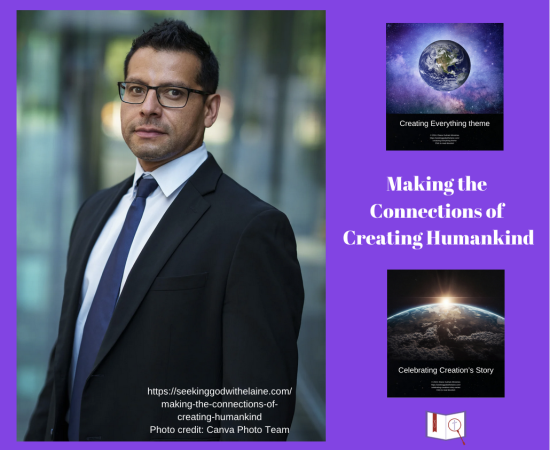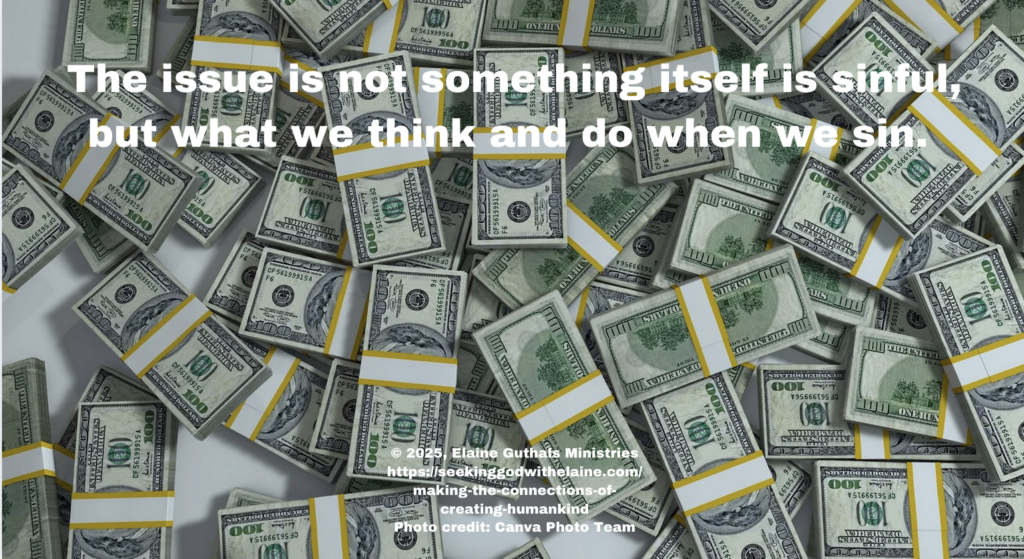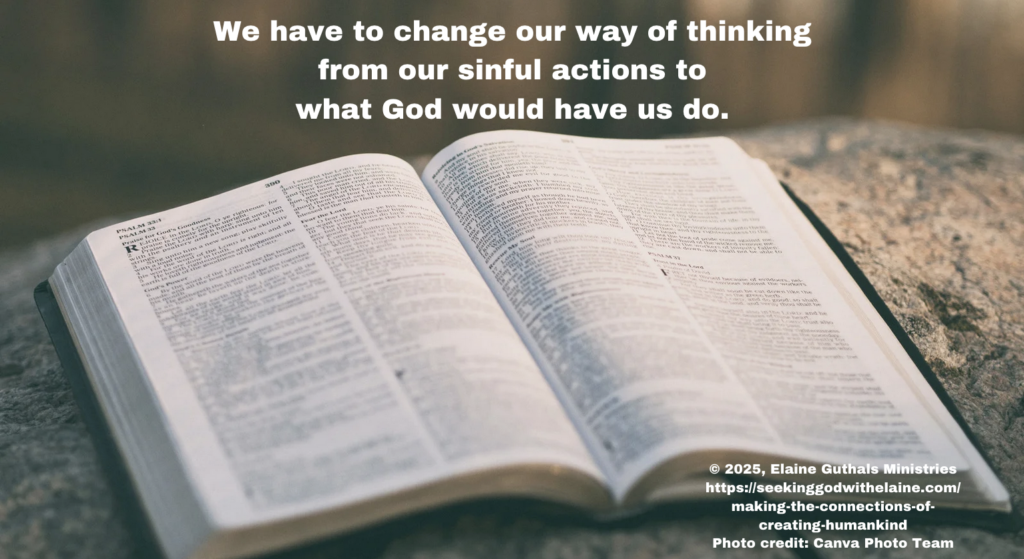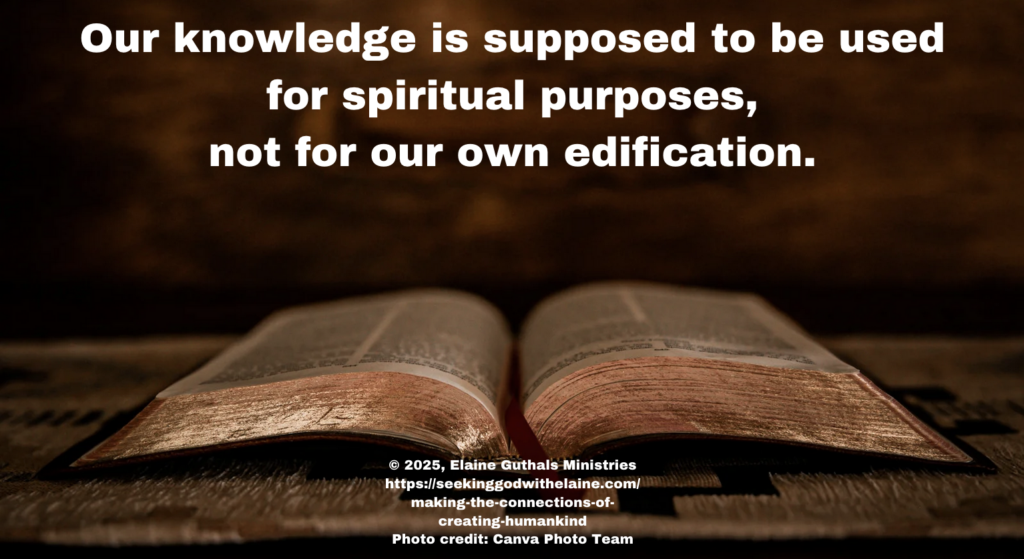The last devotion looked at the creation of humankind. This devotional reading looks at making the connections and application of that.

We started our discussion of God creating humankind in the last devotion. We had several nuggets that we got out of it.
- God created man in His own image.
- The Trinity had a divine consultation to determine how humankind would be created.
- There is no indication here of how the male was made.
- God patterned humankind after Himself.
- Yes, God created only male and female as genders.
God formed us from dust the ground and breathed life into us to put spirit into us. That is the characteristic that separates us from other creations.
Our moral character is definitely not like God’s. We are not pure as He is. There is no way we can do all the do’s and not do all the don’ts — especially after sin was introduced.
Let's Put It into Context
To read devotions in the Creating Everything theme, click the button below.
Devotions in the Celebrating Creation’s Story series
Making the Connections #1
Bevan said something interesting. He wrote, “The adaptation of this world to be man’s place of abode while God tries him by the duty He has placed upon him to perform.”
Resource
Let’s tackle the last part first. Were we created to be tested? Our first response might be indignation.
But think about it. God knew when He created us that we would disobey Him. The deal breaker would be who would be sorrowful about that gross ungratefulness and dishonor and who wouldn’t.
So, the issue is not something itself is sinful, but what we think and do when we sin.

No, that doesn’t give us license to sin. It shows how loving God is to put up with us knowing we would – knowing the majority of humankind would have no problem with continuing to sin and disobey Him.
Making the Connections #2
Ooo, baby. I have to process this. Sheldon asked whether made in God’s image referred to our character or nature. He wrote, “Perfection of original constitution is one thing; perfection of action and of moral character is a different thing.”
Resource
Sheldon noted that the question is still pertinent to us today as all humankind is made in God’s image. He believed that mean we were created with specific spiritual capabilities.
- The ability to reason/intellectual powers
- The ability to feel moral obligation
- Free will that is crucial to building our character through our actions
- The capability to love God and others
Because it does pertain to all — not just Jews — Paul was able to say, “Even Gentiles, who do not have God’s written law, show that they know his law when they instinctively obey it, even without having heard it” (Rom. 2: 14 NLT).
In other words, Gentiles, too, have the specific spiritual capabilities and utilize them to follow God’s laws unknowingly.
So, if each and every one of us have these capabilities, why aren’t we all considered God’s children?
The last two bullet points trip up worldview people. They use their free will to choose to not love God.
What can we do?
- Choose God. “Since you have heard about Jesus and have learned the truth that comes from him, throw off your old sinful nature and your former way of life, which is corrupted by lust and deception” (Eph. 4: 21-22 NLT).
- Keep God’s law. “You are so proud of knowing the law, but you dishonor God by breaking it. No wonder the Scriptures say, “The Gentiles blaspheme the name of God because of you.” The Jewish ceremony of circumcision has value only if you obey God’s law. But if you don’t obey God’s law, you are no better off than an uncircumcised Gentile. And if the Gentiles obey God’s law, won’t God declare them to be his own people?” (Rom. 2: 23-26 NLT).
- Hunger for it. “God blesses those who hunger and thirst for justice, for they will be satisfied” (Mt. 5: 6 NLT).
- Walk in the Spirit. “So I say, let the Holy Spirit guide your lives. Then you won’t be doing what your sinful nature craves” (Gal. 5: 16 NLT).
- Remain faithful. “Jesus said to the people who believed in him, ‘You are truly my disciples if you remain faithful to my teachings. And you will know the truth, and the truth will set you free’” (Jn. 8: 31-32 NLT).
- Stay diligent. “Stay alert! Watch out for your great enemy, the devil. He prowls around like a roaring lion, looking for someone to devour” (I Pet. 5: 8 NLT).
Making the Connections #3
The opening sentence of Robertson and Bonnet’s The Divine in Man reached right out and grabbed me. Robertson wrote, “The heathen, recognizing in their own way the spiritual in man, tried to bridge over the chasm between it and the earthly by making God more human.”
Resource
Ouch! We do try to bring God down to our level, don’t we? The worst way we do that is to say the second greatest commandment is “… ‘Love your neighbor as yourself’” (Mk. 12: 31 NLT) and that means we have to tolerate their sin.
No! God does not tolerate our sin. We have to repent and turn from it. “Now repent of your sins and turn to God, so that your sins may be wiped away” (Ac. 3: 19 NLT).
We have to change our way of thinking from our sinful actions to what God would have us do.

We make God more human by trying to justify our actions and finding ways to say, “God didn’t really mean it that way.”
Yes, God said it exactly as He meant it.
We also try to humanize God by saying He made us so smart that we have figured out something — like creation. For many years, we’ve been told the world was created by the Big Bang theory. This was determined using advanced mathematical models and simulations.
No, God isn’t going to let us figure some things out. He is more interested in our faith than our intelligence.
God wants us to use that intelligence to discern whether He has decreed something to be good/evil or right/wrong.
Making the Connections #4
Look what Hodson said. He wrote,
“His [humankind’s] understanding — the ruling faculty — was made capable of clearly discerning what is really good, of accurately discriminating between right and wrong, of ascertaining correctly, and as it were intuitively, the boundaries of good and evil; the former as consisting in conformity to the Divine will, the latter in deviation from that will. Doubtless that we might be capable of knowing, loving, and serving Him; that we might adore His perfections, obey His will, glorify His holy name. This was Adam’s highest dignity before he fell in the earthly paradise. And this, we have reason to believe, will constitute the happiness of the redeemed in the paradise above. Suffer me then to ask, my brethren, are you mindful of the end for which you were created?”
Resource
Our knowledge is supposed to be used for spiritual purposes, not for our own edification.

Making the Connections #5
We cannot separate body, spirit, and soul. Alford said that it is the spirit which houses our personalities.
Resource
It is the spirit, this divine part, which separates us from animals.
Alford argued that we are made in the image of God because we have the capacity to love. “But anyone who does not love does not know God, for God is love” (I Jn. 4: 8 NLT).
We reach God by exercising faith in Him.
Making the Connections #6
We talked about Jesus having a hand in creation – how everything was made through Him. Paul also talked about that.
“Christ is the visible image of the invisible God. He existed before anything was created and is supreme over all creation, for through him God created everything in the heavenly realms and on earth. He made the things we can see and the things we can’t see — such as thrones, kingdoms, rulers, and authorities in the unseen world. Everything was created through him and for him” (Col. 1: 15-16 NLT).
Jesus, too, is the image of God. While He was on earth, He was the likeness of humankind. We are to emulate Him.
“Have this mind among yourselves, which is yours in Christ Jesus, who, though he was in the form of God, did not count equality with God a thing to be grasped, but emptied himself, by taking the form of a servant, being born in the likeness of men” (Phil. 2: 5-7 ESV).
How Do We Apply This?
- Realize that understanding the dignity of man’s nature being made in God’s image showcases the greatness of humankind’s fall from sin.
- Realize the greatness of humankind’s fall from sin showcases the glory of Christ’s sacrifice to restore us.
- Perform our duty because we are made in His image.
- Do the Matthew 25 to-do list because of our relationships with God, not because it is a good list.
- Worship God as Creator of humankind.
- Respect the fact that we are made in God’s image.
- Choose God.
- Keep God’s law.
- Hunger for it.
- Walk in the Spirit.
- Remain faithful.
- Stay diligent.
- Know the purpose for which we were created – to worship God.
- Use our knowledge to seek God and discern His Will.
- Recognize how horrible the consequences and results of sin are.
- Navigate the Sanctification Road to change our character to return to being like His.
Resource
Father God. You are a Master Creator. You are a great Father. We thank You for creating us and making us in Your image. We pray that You sanctify us to be more like You. Amen.
What do you think?
Leave me a comment below (about this or anything else) or head over to my Facebook group for some interactive discussion.
If you don’t understand something and would like further clarification, please contact me.
If you have not signed up for the email providing the link to the devotions and the newsletter, do so below.
If God has used this devotion to speak with you, consider sharing it on social media.